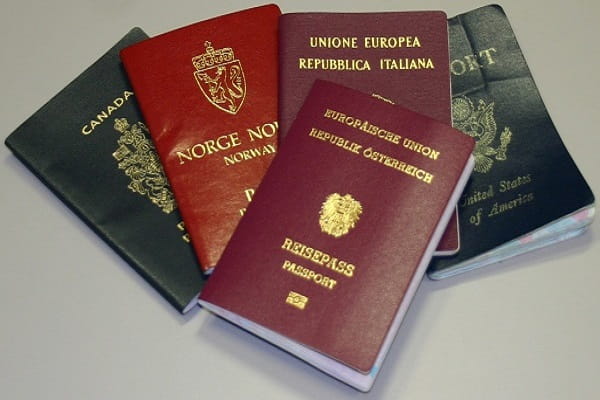Learn How To Start A Business In The UK
Starting a business in another country is no longer a great mystery in this century. Knowledge about this process has encouraged more and more people to invest in a business abroad. If you are also interested in this subject, in this article, you will see how to start a business in the United Kingdom.

The United Kingdom is among the countries that other less developed countries are most interested in moving to and starting a new life. Investing in a new business can be one way to do this. Keep reading and find out what you need to open a company in the UK.
Types of companies that foreigners can open in the UK
There are some types of companies that can be opened in the United Kingdom by foreigners, which differ from the options for natives of the country.
Sole trader
The individual trader acts alone, so he receives all the profit from the business but has to pay his income tax and social security. This type of entrepreneur is responsible for all business debts of the company.
This category also includes freelancers registered as self-employed and who pay certain taxes and social security fees.
General Partnership
Companies created in this model rely on two or more individuals – or companies, acting together. That is, responsibilities and gains are shared equally. However, each member pays tax on their earnings.
It is a type of structure more suitable for small companies.
Limited partnership
Similar to general partnerships in some respects, a limited partnership has a general partner who is responsible for the business. In addition, it has a limited partner, who contributes financially and is only responsible for his contribution.
Limited Liability Partnership (LLP)
In this case, the partners are not responsible for the company’s debts. To start a partnership like this, you need to write and register an LLP agreement with Companies House, the body responsible for registering companies in the UK.
Limited Private Company (Ltd)
This type of company is a legal entity with no relationship to its directors. These are corporations incorporated by registration at Companies House, but which require at least one director and one shareholder. Shares of Private Limited Companies cannot be publicly traded.
Public Limited Company (PLC)
A corporation is different from a limited liability company in that its shares can be publicly traded. To start this type of business, you need to have a minimum share capital of £50,000, with at least 25% paid before starting the business.
Unlimited company
Unlimited companies are not a very common model in the UK. In this type of company, shareholders have joint and unlimited liability for business debts. This means that they can be covered with personal assets in case the business assets do not meet the business debts.
Offshore company
Offshore companies are registered, established or incorporated outside the country of residence. These are organizations operating in popular offshore financial centers and tax havens. This type of company can offer several benefits to companies and their directors. However, you need to know its rules well before defining how your configuration will be.
How can a Foreigner open a company in the UK?
Any foreigner with a European passport can open a company in the United Kingdom. In these cases, it is necessary to have the document that proves the right to stay in the country, the indefinite leave or remain or permanent residence authorization document.
For those without the right to remain legally, who only have their country passport, it is necessary to apply for a specific visa and invest a sum of money, the minimum is £50,000.
Visa for entrepreneurs
The British government encourages investors and entrepreneurs to enter the country. One of the ways to encourage this participation is by creating specific visas for these profiles. The T1 visa is indicated for foreigners who want to undertake.
Entrepreneurs
It is suitable for entrepreneurs, who must invest at least £50,000 in investment funds. This profile needs to pay a fee of £1,277 for the applicant and the same amount for each of their dependents.
Entrepreneurs must also pay a health surcharge, according to the age of each person, the place where they will live and the number of dependents.
With this visa, the entrepreneur can stay three years and four months in the United Kingdom and has the right to extend his stay for another two years. After that period, it is possible to apply for permanent residence. Family members can also move to the country.
Newly Graduated Entrepreneurs
In the case of newly formed entrepreneurs, it is necessary to have the endorsement of the Department for International Trade (DIT) or a British higher education institution. Applicant pays a fee of £363 and the age-appropriate health surcharge.
This visa is valid for one year and may be extended for another year. However, this entrepreneur cannot apply for a permanent residence visa.
Investors
This modality is intended for those who wish to invest from £2 million in British government bonds, share capital or loans in companies registered and active in the United Kingdom.
Those with more than £10 million to invest can apply for a permanent visa and those with more than £5 million can apply for a three-year visa. The process can take around three months. The cost of this visa is £1,623 and the health surcharge must be paid.
What does it take to set up a company in the UK?
To open a company in the UK, you need to meet certain requirements:
- Be over 18 years old;
- Minimum capital of £1 for limited company;
- Open a bank account and have at least £100. For limited liability companies, the minimum share capital is £50,000;
- Have at least one director, one partner and the position of secretary;
- For the SA company, a minimum of three shareholder partners;
- Take out special insurance, the employer’s liability insurance, of at least £5 million from an authorized insurer.
Step by step to open a company in the UK
Step 1: Check your legal status in the country
Confirm that you have the necessary visa and permission to start a business. Citizens who do not belong to the European Union or European Free Trade Association (EFTA) need to have a visa and residence permit.
Step 2: Write the company’s business plan
Every entrepreneur in the UK needs a business plan. This document defines what the entrepreneur’s business ideas are and what are the probabilities of success and sustainability. To create one, research the market and forecast your budget. The UK government website has a business plan and cash flow forecast templates available for download.
Step 3: Define the best business structure for your company
Choose the right company type to frame your new business. Consider the structure of your company, the type of activity, taxes and permits that need to be issued.
Step 4: Define the company name and address
Choose a name for your business and define the business address for the business. The sole proprietorship may use his own name on the business. The address is mandatory for registering the company for tax purposes and for registering the company.
Name registration is mandatory only for limited companies. Other types of companies can register as a trademark to prevent other companies from using the same name.
Step 5: Register your company
Look for HMRC in the UK to register your business for tax purposes. Limited partnerships need to register with Companies House.
Step 6: Find out about any additional rules
In the United Kingdom, starting a business may have additional requirements, such as licenses or permits, insurance and rules to be followed.
How much does it cost to start a company in the UK?
Starting a company in the UK costs between £12 and £100. The amount depends on the business model and type of company. The simplest and cheapest process is to register a limited company on the Companies House website, for £12 or £40 by post.
Read Also: Best Business Schools In The World [Top Ranked]
In addition, you need to consider the taxes that need to be paid after the business is open:
- Income tax: it’s like income tax on business profit;
- Corporation Tax;
- VAT: for companies with revenue in excess of £85,000 calculated at the end of each tax year;
- National Insurance Number: calculated according to the tax return form;
- Income Tax and National Insurance Number for each hired employee.







Thanks for sharing. I read many of your blog posts, cool, your blog is very good. https://www.binance.info/register?ref=IXBIAFVY
xn88 không chỉ là nơi đặt cược – đó là không gian giải trí đẳng cấp, nơi mỗi vòng quay đều mang theo hy vọng và niềm vui. Hãy đăng ký ngay hôm nay để bắt đầu hành trình của bạn! TONY02-03H
https://taptabus.ru/1win
https://t.me/s/official_1win_official_1win
https://t.me/s/Russia_Casino_1WIN
https://t.me/ta_1win/1061
https://t.me/s/it_eZCaSh
Thanks for sharing. I read many of your blog posts, cool, your blog is very good.
https://t.me/s/iGaming_live/4880
https://t.me/s/Martin_casino_officials
https://t.me/s/Beefcasino_officials
https://t.me/s/iGaming_live/4866
https://t.me/Martin_officials
https://t.me/s/officials_pokerdom/3648
https://telegra.ph/Beef-kazino-11-25
https://t.me/s/Official_Ru_1WIN
Окружи себя выгодой — заходи на официальный сайт 1win букмекерская и начинай выигрывать сегодня! Наслаждайся высокими коэффициентами на ставки на спорт и лайв-ставки, получай до 300 фриспинов и бонус за депозит до 15 000 рублей, легко делай ставки в онлайн казино и слоты, а быстрый вывод средств и кэшбэк 10% для постоянных игроков обеспечат реальный выигрыш. Регистрация всего за минуту — играй круглосуточно, пользуйся промокодом и получай максимум удовольствия от ставок и азартных игр!
Форсаж 1 машина вин дизеля как называется — узнавайте прямо сейчас в 1win! В нашем онлайн казино и на линии ставок на спорт вас ждут необычайные бонусы за депозит до 150%, фриспины, кэшбэк до 10%, быстрый вывод выигрышей и больше тысячи слотов и лайв-игр. Регистрация простая и быстрая, пополнение счета всего за минуту, а личный кабинет позволяет следить за выигрышами и активностью 24/7 — испытайте реальный выигрыш уже сегодня!
Драйверы win 8 1 – начни выигрывать уже сегодня с 1win! Удобный личный кабинет, быстрый вывод средств, высокие коэффициенты на ставки на спорт и лайв-ставки, а также щедрые бонусы за депозит до 5000 рублей и 50 фриспинов. Играйте в онлайн казино, делайте ставки, получайте кэшбэк и выигрывайте реальные деньги с минимальным депозитом и круглосуточной поддержкой!
1win выиграть огромные — начни прямо сейчас! Открывай личный кабинет, получай бонусы до 100% за депозит, выигрывай с высокими коэффициентами на ставки на спорт или крутые слоты и лайв-казино, активируй фриспины и промокод для бонусных фриспинов, участвуй в быстрых выплатах и кэшбэке до 10%. Легко делать ставки, управлять финансами и выигрывать реальный выигрыш круглосуточно!
https://t.me/of_1xbet/899
https://t.me/s/om_1xbet/10
https://t.me/om_1xbet/12
https://t.me/om_1xbet/15
https://t.me/om_1xbet/8
https://t.me/om_1xbet/7
https://t.me/s/om_1xbet/13
https://t.me/om_1xbet/14
https://t.me/top_casino_rating_ru/12
https://t.me/s/om_1xbet/3
https://t.me/top_casino_rating_ru/9
https://t.me/top_casino_rating_ru/8
https://t.me/om_1xbet/4
http://italianpurchase.tv/__media__/js/netsoltrademark.php?d=https://t.me/s/Official_1xbet_1xbet/1661
http://genii-gi.co/__media__/js/netsoltrademark.php?d=https://t.me/s/Official_1xbet_1xbet/1606
http://presshelpkey.com/__media__/js/netsoltrademark.php?d=https://t.me/s/Official_1xbet_1xbet/1098
https://www.avito.ru/surgut/predlozheniya_uslug/apparatnyy_manikyur_i_pedikyur_s_pokrytiem_4030660549?utm_campaign=native&utm_medium=item_page_ios&utm_source=soc_sharing_seller
http://images.google.co.ma/url?q=https://t.me/Official_1xbet_1xbet/74
http://mitekindustriesltd.co.uk/__media__/js/netsoltrademark.php?d=https://t.me/s/Official_1xbet_1xbet/1295
http://jeffreyfoster.com/__media__/js/netsoltrademark.php?d=https://t.me/s/Official_1xbet_1xbet/1766
https://t.me/top_online_kazino/5
https://t.me/top_online_kazino/7
https://t.me/top_online_kazino/10
https://t.me/s/top_online_kazino/8
https://t.me/top_online_kazino/8
https://t.me/s/top_online_kazino/5
https://t.me/s/top_online_kazino/7
https://t.me/s/top_online_kazino/9
https://t.me/top_online_kazino/9
https://t.me/top_online_kazino/8
https://t.me/Topcasino_licenziya/54
https://t.me/kazino_s_licenziei/6
https://t.me/Topcasino_licenziya/17
https://t.me/s/Topcasino_licenziya/18
https://t.me/Topcasino_licenziya/22
https://t.me/s/kazino_s_licenziei/13
https://t.me/Official_1xbet1/298
https://t.me/s/Official_1xbet1/1328
https://t.me/Official_1xbet1/593
https://t.me/s/Official_1xbet1/1213
https://t.me/s/Official_1xbet1/1041
https://t.me/s/Official_1xbet1/1409
https://t.me/s/Official_1xbet1/981
https://t.me/s/Official_1xbet1/665
https://t.me/s/rq_1xbet/1009
https://t.me/s/rq_1xbet/623
https://t.me/s/rq_1xbet/883
https://t.me/s/rq_1xbet/751
https://t.me/s/rq_1xbet/1424
https://t.me/rq_1xbet/630
https://t.me/rq_1xbet/1415
https://t.me/rq_1xbet/1503
https://t.me/da_1xbet/3
https://t.me/da_1xbet/4
https://t.me/da_1xbet/8
https://t.me/da_1xbet/7
https://t.me/da_1xbet/12
https://t.me/da_1xbet/6
https://t.me/da_1xbet/2
https://t.me/da_1xbet/15
https://t.me/da_1xbet/11
https://t.me/da_1xbet/5
https://t.me/kazino_bez_filtrov
https://t.me/s/kazino_bez_filtrov
https://telegra.ph/Top-kazino-11-14-2
https://t.me/a_Topcasino/4
https://t.me/a_Topcasino/2
https://t.me/a_Topcasino/9
https://t.me/a_Topcasino/6
https://t.me/top_ratingcasino/9
https://t.me/top_ratingcasino/5
https://t.me/topcasino_rus/
https://t.me/s/reyting_topcazino/14
https://t.me/s/Best_rating_casino
https://t.me/s/ah_1xbet/4
https://t.me/ah_1xbet/8
https://t.me/s/ah_1xbet/13
https://t.me/ah_1xbet/7
https://t.me/ah_1xbet/19
https://t.me/ah_1xbet/5
https://t.me/ah_1xbet/13
https://t.me/ah_1xbet/12
https://t.me/s/ah_1xbet/15
https://t.me/ah_1xbet/20
https://t.me/s/ah_1xbet/6
https://t.me/s/ah_1xbet/3
https://t.me/s/rating_online
https://t.me/surgut_narashchivaniye_nogtey/16
https://t.me/s/surgut_narashchivaniye_nogtey/4
https://t.me/s/surgut_narashchivaniye_nogtey/15
https://t.me/va_1xbet/14
https://t.me/s/va_1xbet/6
https://t.me/s/va_1xbet/22
https://t.me/s/va_1xbet/3
https://t.me/va_1xbet/19
https://t.me/va_1xbet/17
https://t.me/s/va_1xbet/19
https://t.me/s/va_1xbet/9
https://t.me/va_1xbet/7
https://t.me/s/va_1xbet/7
https://t.me/s/va_1xbet/5
https://t.me/s/va_1xbet/13
https://t.me/s/iGaming_live/4798
https://t.me/va_1xbet/18
https://t.me/s/Leon_egs/14
https://t.me/s/Vodka_egs/5
https://t.me/s/Martin_egs/7
https://t.me/s/CasinoX_egs/22
https://t.me/s/JoyCasino_egs/15
https://t.me/Drip_egs/14
https://t.me/s/Martin_egs/10
https://t.me/Kent_egs/19
https://t.me/s/Pokerdom_egs/9
https://t.me/s/MostBet_egs/17
https://t.me/s/Booi_egs/13
https://t.me/s/Legzo_egs/15
https://t.me/Volna_egs/14
https://t.me/Gama_egs/3
https://t.me/s/JoyCasino_egs/22
https://t.me/Rox_egs/6
https://t.me/Flagman_egs/18
https://t.me/s/Irwin_egs/19
https://t.me/Gizbo_egs/8
https://t.me/s/R7_egs/14
https://t.me/s/Fresh_egs/17
https://t.me/Volna_egs/3
https://t.me/iGaming_live/4564
https://t.me/s/official_Stake_es
https://t.me/s/official_GGBet_ed
https://t.me/s/official_Riobet_ed
https://t.me/s/official_Pokerdom_es
https://t.me/s/official_Daddy_ed
https://t.me/s/official_Kent_es
https://t.me/s/official_1xSlots_ed
https://t.me/s/official_1xbet_ed
https://t.me/s/official_Irwin_es
https://t.me/s/official_Flagman_es
https://t.me/s/official_Starda_es
https://t.me/s/official_Vulkan_es
https://t.me/s/official_Sol_ed
https://t.me/s/official_DragonMoney_es
https://t.me/s/official_Kent_ed
https://t.me/s/official_Rox_ed
https://t.me/s/official_CatCasino_es
https://t.me/s/official_1Go_ed
https://t.me/s/official_Flagman_edxjqqc
https://t.me/s/official_Fresh_es
https://t.me/s/official_Martin_es
https://t.me/s/official_Sol_es
https://t.me/topcasino_rus/
https://t.me/s/a_Top_onlinecasino/6
https://t.me/a_Top_onlinecasino/10
https://t.me/a_Top_onlinecasino/18
https://t.me/a_Top_onlinecasino/13
https://t.me/s/a_Top_onlinecasino/13
https://t.me/a_Top_onlinecasino/8
https://t.me/s/a_Top_onlinecasino/15
https://t.me/s/a_Top_onlinecasino/3
https://t.me/a_Top_onlinecasino/3
https://t.me/s/a_Top_onlinecasino/7
https://t.me/s/topcasino_v_rossii
https://t.me/s/top_kazino_z
https://t.me/s/ke_Jet
https://t.me/s/ke_PlayFortuna
https://t.me/s/official_1win_aviator/36
https://t.me/s/ke_MostBet
https://t.me/s/kef_Rox
https://t.me/s/ke_Starda
https://t.me/s/ke_Pin_Up
https://t.me/s/kef_Lex
https://t.me/s/ke_Vodka
https://t.me/s/ke_1Go
https://t.me/s/ke_DragonMoney
https://t.me/s/ke_Leon
https://t.me/s/ke_Sol
https://t.me/s/ke_Monro
https://t.me/s/ke_1xSlots
https://t.me/s/ke_Booi
https://t.me/s/kef_R7
https://t.me/s/ke_JoyCasino
https://t.me/s/ke_Pinco
https://t.me/s/ke_Daddy
https://t.me/s/ke_Flagman
https://t.me/s/ke_Martin
https://t.me/s/ke_Legzo
https://t.me/s/ke_Kometa
https://t.me/s/ke_1Win
https://t.me/s/ke_kent
https://t.me/s/ke_Volna
https://t.me/s/ke_Drip
https://t.me/s/ke_CatCasino
https://t.me/s/ke_Izzi
https://t.me/s/ke_1xbet
https://t.me/s/ke_Fresh
https://t.me/official_1win_aviator/129
https://t.me/s/ke_Vulkan
https://t.me/s/ke_Irwin
https://t.me/s/ke_Riobet
https://t.me/s/uD_StAkE
https://t.me/s/UD_gGbET
https://t.me/s/UD_PInco
https://t.me/s/ud_keNT
https://t.me/s/UD_VODKA
https://t.me/s/ud_rox
https://t.me/s/ud_DRagoNmonEY
https://t.me/s/uD_LEgzO
https://t.me/s/Ud_gAMa
https://t.me/s/ud_lEon
https://t.me/s/ud_riObet
https://t.me/s/ud_CAsiNo_X
https://t.me/s/UD_DADdy
https://t.me/s/ud_monro
https://t.me/s/ud_1Go
https://t.me/s/kfo_1win
https://t.me/s/tf_1win
https://t.me/s/Top_bk_ru
https://t.me/s/kfo_1win
https://t.me/s/tf_1win
https://t.me/s/Ud_MRbiT
https://t.me/s/ud_JoycaSino
https://t.me/s/ud_1XsLOtS
https://t.me/s/uD_stArda
https://t.me/s/ud_StaKe
https://t.me/official_1win_aviator/88
https://t.me/s/UD_drIp
https://t.me/s/ud_1Go
https://t.me/s/official_1win_aviator/38
https://t.me/s/uD_CASinO_X
https://t.me/s/Beefcasino_rus
https://t.me/s/UD_BOoI
https://t.me/s/UD_lex
https://t.me/s/UD_pinCo
https://t.me/s/Ud_monRo
https://t.me/s/UD_LegzO
https://t.me/s/ud_voDkA
https://t.me/s/ud_Kent/41
https://t.me/ud_1xbet/34
https://t.me/s/ud_GGBet/7
https://t.me/ud_Pinco/48
https://t.me/ud_Booi/46
https://t.me/s/ud_1xSlots/46
https://t.me/ud_Starda/57
https://t.me/s/ud_Fresh/47
https://t.me/ud_Starda/45
https://t.me/s/ud_Pokerdom/59
https://t.me/ud_Irwin/54
https://t.me/s/ud_JoyCasino/46
https://t.me/ud_Flagman/46
https://t.me/Beefcasino_rus/59
https://t.me/s/ud_JoyCasino/55
https://t.me/s/ud_DragonMoney/55
https://t.me/s/ud_Irwin/59
https://t.me/ud_GGBet/53
https://t.me/ud_Vulkan/63
https://t.me/s/ud_Jet/62
https://t.me/ud_Riobet/58
https://t.me/ud_Vulkan/62
https://t.me/ud_Drip/44
https://t.me/ud_Martin/46
https://t.me/ud_Fresh/53
https://t.me/s/ud_Pinco/61
https://t.me/s/ud_MrBit/45
https://t.me/ud_Pin_Up/49
https://t.me/s/ud_1xSlots/63
https://t.me/ud_Casino_X/48
https://t.me/Beefcasino_rus/57
https://t.me/Best_promocode_rus/1669
https://t.me/s/Best_promocode_rus/2614
https://t.me/Official_mellstroy_casino/54
https://t.me/Official_mellstroy_casino/52
https://t.me/s/Official_mellstroy_casino/21
https://t.me/s/Official_mellstroy_casino/19
https://t.me/s/Official_mellstroy_casino/29
https://t.me/Official_mellstroy_casino/38
https://t.me/Official_mellstroy_casino/36
https://t.me/Official_mellstroy_casino/55
https://t.me/s/Official_mellstroy_casino/37
https://t.me/Official_mellstroy_casino/17
https://t.me/Official_mellstroy_casino/20
https://t.me/Beefcasino_rus/21
https://t.me/Official_mellstroy_casino/49
https://t.me/s/Official_mellstroy_casino/16
https://t.me/s/bs_1Win/617
https://t.me/s/bs_1Win/1119
https://t.me/bs_1Win/362
https://t.me/s/bs_1Win/555
https://t.me/bs_1Win/551
https://t.me/bs_1Win/1178
https://t.me/bs_1Win/454
https://t.me/s/bs_1Win/682
https://t.me/s/bs_1Win/1218
https://t.me/s/bs_1Win/466
https://t.me/bs_1Win/1081
https://t.me/s/bs_1Win/417
https://t.me/jw_1xbet/477
https://t.me/jw_1xbet/333
https://t.me/s/jw_1xbet/771
https://t.me/s/jw_1xbet/346
https://t.me/s/jw_1xbet/949
https://t.me/s/jw_1xbet/12
https://t.me/bs_1xbet/37
https://t.me/bs_1xbet/23
https://t.me/bs_1xbet/34
https://t.me/s/bs_1xbet/42
https://t.me/s/bs_1xbet/10
https://t.me/bs_1xbet/6
https://t.me/s/bs_1xbet/11
https://t.me/bs_1xbet/20
https://t.me/s/bs_1xbet/45
https://t.me/bs_1xbet/23
https://t.me/bs_1xbet/43
https://t.me/s/bs_1xbet/31
https://t.me/bs_1xbet/49
https://t.me/s/bs_1xbet/37
https://t.me/bs_1xbet/29
https://t.me/bs_1xbet/9
https://t.me/s/bs_1xbet/45
https://t.me/bs_1xbet/9
https://t.me/s/bs_1xbet/6
https://t.me/s/Official_beefcasino
https://t.me/s/iw_1xbet
https://t.me/s/ofitsialniy_1win
https://t.me/s/ofitsialniy_1win/33/nix
https://t.me/s/PlayCasino_1xbet
https://t.me/s/PlayCasino_1win
https://t.me/s/PlayCasino_1win
https://t.me/s/PlayCasino_1xbet
https://t.me/s/Gaming_1xbet
https://t.me/s/reiting_top10_casino/5
https://t.me/s/reiting_top10_casino/9
https://t.me/reiting_top10_casino/8
https://t.me/s/reiting_top10_casino/10
https://t.me/s/reiting_top10_casino/6
https://t.me/reiting_top10_casino/5
https://t.me/reiting_top10_casino
https://t.me/reiting_top10_casino/10
https://t.me/reiting_top10_casino/7
https://t.me/reiting_top10_casino/6
https://t.me/reiting_top10_casino/3
https://t.me/s/reiting_top10_casino/3
https://t.me/s/reiting_top10_casino/2
https://t.me/reiting_top10_casino/2
https://t.me/reiting_top10_casino/9
https://t.me/s/reiting_top10_casino/8
https://t.me/reiting_top10_casino/4
https://t.me/s/reiting_top10_casino
https://t.me/s/official_1win_aviator
https://t.me/s/topslotov
https://t.me/Official_1xbet_1xbet/1772
https://t.me/Official_1xbet_1xbet/1747
https://t.me/Official_1xbet_1xbet/1787
https://t.me/s/Official_1xbet_1xbet/1706
https://t.me/s/Official_1xbet_1xbet/1625
https://t.me/s/Official_1xbet_1xbet/1825
https://t.me/Official_1xbet_1xbet/1603
https://t.me/s/Official_1xbet_1xbet/1643
https://t.me/Official_1xbet_1xbet/1630
https://t.me/s/Official_1xbet_1xbet/1644
https://t.me/s/Official_1xbet_1xbet/1711
https://t.me/Official_1xbet_1xbet/1628
https://t.me/s/Official_1xbet_1xbet/1621
https://t.me/Official_1xbet_1xbet/1733
https://t.me/Official_1xbet_1xbet/1599
https://t.me/s/Official_1xbet_1xbet/1649
https://t.me/s/Official_1xbet_1xbet/1716
https://t.me/Official_1xbet_1xbet/1776
https://t.me/Official_1xbet_1xbet/1699
https://t.me/s/Official_1xbet_1xbet/1705
https://t.me/Official_1xbet_1xbet/1843
https://t.me/Official_1xbet_1xbet/1620
https://t.me/Official_1xbet_1xbet/1766
https://t.me/Official_1xbet_1xbet/1613
https://t.me/s/Official_1xbet_1xbet/1773
https://t.me/Official_1xbet_1xbet/1828
https://t.me/Official_1xbet_1xbet/1825
https://t.me/Official_1xbet_1xbet/1775
https://t.me/s/Official_1xbet_1xbet/1839
https://t.me/Official_1xbet_1xbet/1844
https://t.me/s/Official_1xbet_1xbet/1605
https://t.me/Official_1xbet_1xbet/1804
https://t.me/Official_1xbet_1xbet/1806
I don’t think the title of your article matches the content lol. Just kidding, mainly because I had some doubts after reading the article.
https://t.me/Official_1xbet_1xbet/1845
https://t.me/Official_1xbet_1xbet/1746
https://t.me/s/Official_1xbet_1xbet/1618
https://t.me/Official_1xbet_1xbet/s/479
https://t.me/Official_1xbet_1xbet/s/496
https://t.me/Official_1xbet_1xbet/s/208
https://t.me/Official_1xbet_1xbet/s/1109
https://t.me/Official_1xbet_1xbet/s/749
https://t.me/Official_1xbet_1xbet/s/1183
https://t.me/Official_1xbet_1xbet/s/647
https://t.me/Official_1xbet_1xbet/s/416
https://t.me/Official_1xbet_1xbet/s/373
https://t.me/Official_1xbet_1xbet/s/322
https://t.me/Official_1xbet_1xbet/s/258
https://t.me/Official_1xbet_1xbet/s/554
https://t.me/Official_1xbet_1xbet/s/1019
https://t.me/Official_1xbet_1xbet/s/1023
https://t.me/Official_1xbet_1xbet/s/985
https://t.me/Official_1xbet_1xbet/s/80
https://t.me/Official_1xbet_1xbet/s/622
https://t.me/Official_1xbet_1xbet/s/1414
https://t.me/Official_1xbet_1xbet/s/1227
https://t.me/Official_1xbet_1xbet/s/1087
https://t.me/Official_1xbet_1xbet/s/426
https://t.me/Official_1xbet_1xbet/s/1313
https://t.me/Official_1xbet_1xbet/s/561
https://t.me/Official_1xbet_1xbet/s/1317
https://t.me/Official_1xbet_1xbet/s/931
https://t.me/Official_1xbet_1xbet/s/1203
https://t.me/rating_online/5
https://t.me/rating_online/3
https://t.me/s/rating_online/5
https://t.me/s/Official_1xbet_1xbet
https://t.me/s/Online_1_xbet/1126
Your article helped me a lot, is there any more related content? Thanks!
facebook bm account buy business manager for sale
buy facebook bm buy-business-manager-verified.org
facebook business account for sale buy verified business manager facebook
facebook verified business manager for sale buy facebook business account
buy fb business manager buy facebook ads accounts and business managers
facebook business manager account buy https://buy-verified-business-manager-account.org
buy fb business manager https://buy-bm-account.org
buy google adwords account buy google ads verified account
verified business manager for sale buy facebook business manager account
buy account google ads https://ads-agency-account-buy.click
google ads accounts https://sell-ads-account.click
buy adwords account https://buy-ads-agency-account.top
buy google ads threshold account google ads accounts for sale
google ads account buy buy google ads agency account
buy old google ads account google ads agency account buy
buy google ads threshold accounts buy old google ads account
facebook accounts for sale https://buy-accounts.click
adwords account for sale https://buy-ads-accounts.click/
buy google ads threshold account https://buy-ads-account.top
buy facebook advertising cheap facebook advertising account
buy facebook ads accounts buy facebook profiles
cheap facebook accounts https://ad-account-for-sale.top
facebook ad account for sale https://buy-ads-account.work
facebook ad account buy facebook ad account buy
buying facebook ad account cheap facebook accounts
facebook ad accounts for sale buy fb ad account
buy facebook accounts https://buy-ad-accounts.click
buy facebook accounts cheap buy aged facebook ads accounts
маркетплейс аккаунтов https://kupit-akkaunt.online
площадка для продажи аккаунтов https://akkaunty-dlya-prodazhi.pro/
площадка для продажи аккаунтов https://online-akkaunty-magazin.xyz
площадка для продажи аккаунтов https://akkaunty-optom.live
маркетплейс аккаунтов соцсетей kupit-akkaunty-market.xyz
продажа аккаунтов akkaunty-market.live
продажа аккаунтов akkaunt-magazin.online
купить аккаунт купить аккаунт
покупка аккаунтов https://rynok-akkauntov.top
площадка для продажи аккаунтов https://akkaunty-na-prodazhu.pro/
secure account purchasing platform https://accounts-marketplace-best.pro
marketplace for ready-made accounts buy accounts
database of accounts for sale account marketplace
account buying platform https://buy-accounts.live/
purchase ready-made accounts https://buy-accounts-shop.pro
database of accounts for sale buy accounts
social media account marketplace buy accounts
account exchange service https://accounts-marketplace.live
account sale https://social-accounts-marketplaces.live
sell accounts https://buy-best-accounts.org/
account selling service https://accounts-marketplace.xyz
profitable account sales https://accounts-offer.org
buy pre-made account account exchange service
account catalog account purchase
account buying platform sell account
social media account marketplace purchase ready-made accounts
accounts marketplace accounts for sale
secure account sales accounts marketplace
accounts market https://marketplace-social-accounts.org/
account acquisition purchase ready-made accounts
account sale secure account sales
account trading account trading
sell account account store
website for buying accounts website for buying accounts
account buying service account buying platform
account sale account market
account trading platform https://social-accounts.org
account trading accounts marketplace
buy pre-made account account marketplace
profitable account sales secure account sales
account catalog https://discountaccountsmarket.com/
sell accounts account buying service
gaming account marketplace account marketplace
account market account buying service
guaranteed accounts account market
accounts marketplace account trading
buy account sell pre-made account
database of accounts for sale social media account marketplace
account market gaming account marketplace
Account Acquisition Guaranteed Accounts
Sell Account Marketplace for Ready-Made Accounts
Marketplace for Ready-Made Accounts Sell Account
Sell Account Account Purchase
Accounts for Sale Account Store
Account exchange Sell accounts
Buy accounts Website for Buying Accounts
Purchase Ready-Made Accounts Sell accounts
Purchase Ready-Made Accounts Find Accounts for Sale
Buy and Sell Accounts Database of Accounts for Sale
безопасная сделка аккаунтов заработок на аккаунтах
площадка для продажи аккаунтов услуги по продаже аккаунтов
продать аккаунт биржа аккаунтов
маркетплейс аккаунтов магазин аккаунтов
маркетплейс аккаунтов https://magazin-akkauntov-online.ru/
биржа аккаунтов маркетплейс аккаунтов соцсетей
продать аккаунт безопасная сделка аккаунтов
Thank you for your sharing. I am worried that I lack creative ideas. It is your article that makes me full of hope. Thank you. But, I have a question, can you help me?
Your point of view caught my eye and was very interesting. Thanks. I have a question for you.